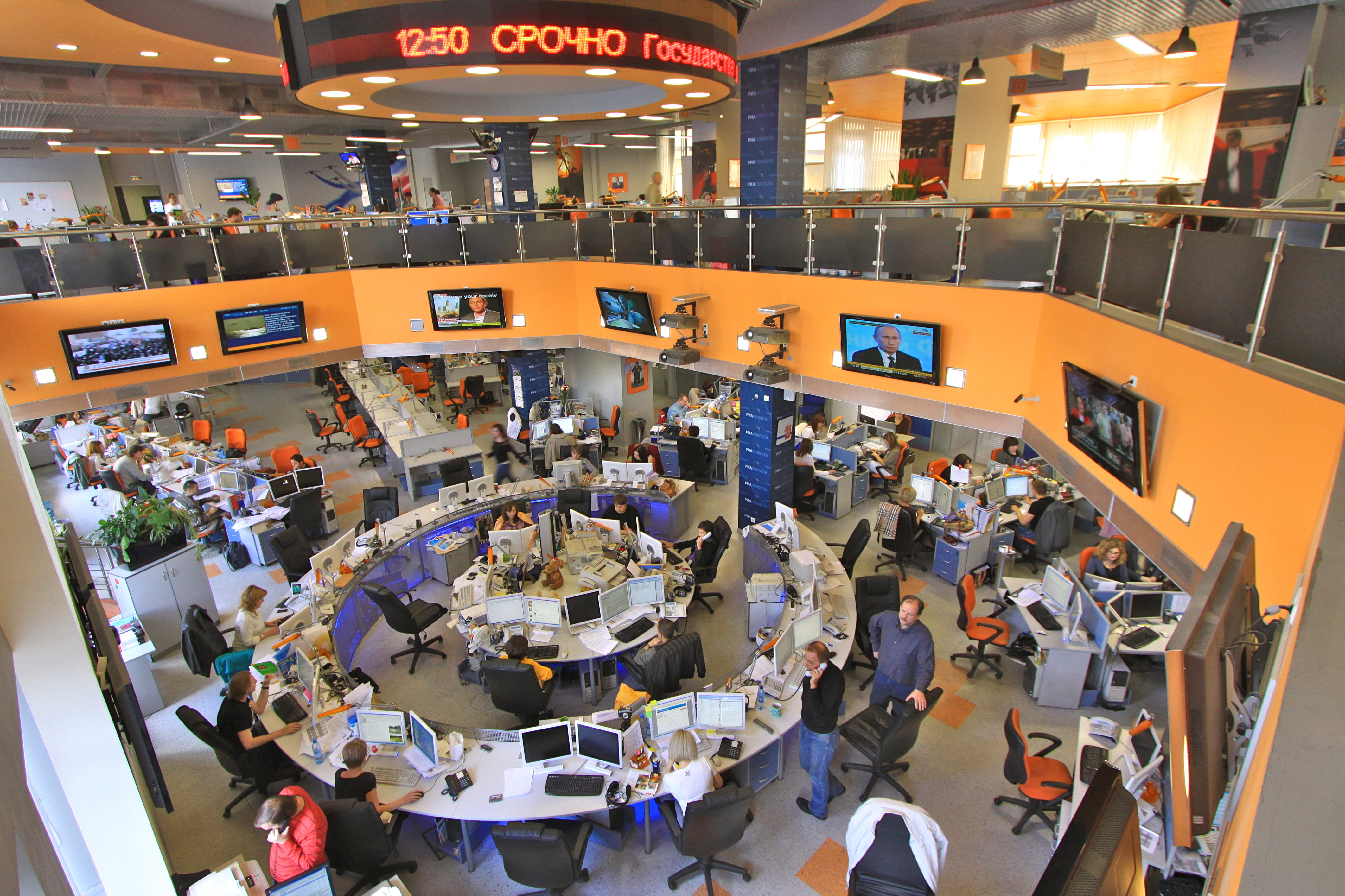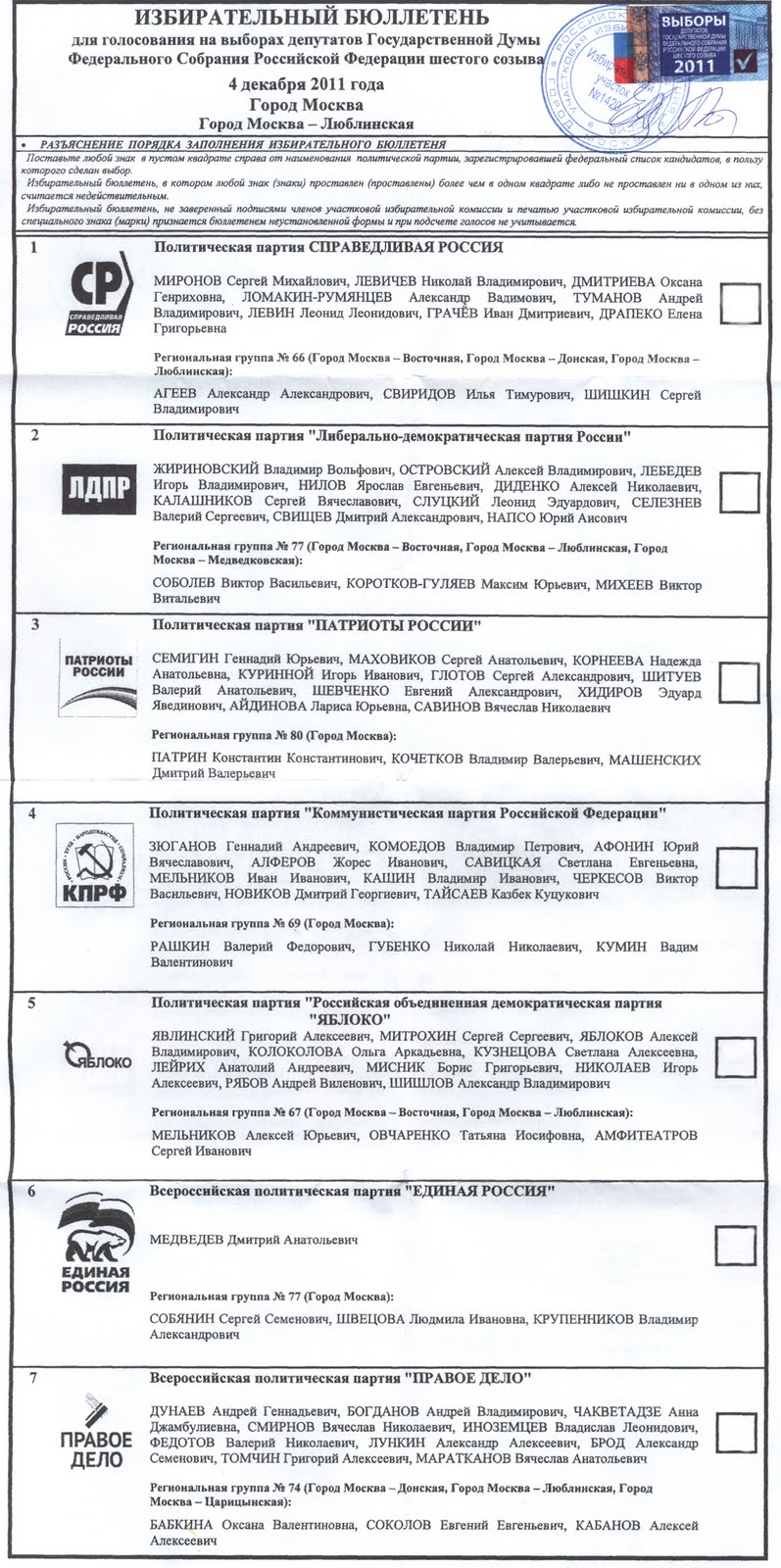|
Legislative Elections In Russia
Russian legislative elections determine the composition of the State Duma, the lower house of the Russian parliament, for the next five years. According to the current Russian legislation, 225 from the 450 mandates of the State Duma are distributed among the lists of political parties that received more than 5% of the votes. The other 225 are the winners of elections in single-mandate constituencies. The elections of 1993–2003 and 2016–2021 were held according to this scheme. In 2007 and 2011, the threshold was 7% and all 450 members of the Duma were elected by party lists. Next legislative election * 2026 Russian legislative election See also * Elections in Russia On the federal level, Russia elects a president as head of state and a parliament, one of the two chambers of the Federal Assembly (Russia), Federal Assembly. The president is elected for, at most, two consecutive six-year terms by the people (ra ... References {{Russia topics ... [...More Info...] [...Related Items...] OR: [Wikipedia] [Google] [Baidu] |
State Duma
The State Duma (russian: Госуда́рственная ду́ма, r=Gosudárstvennaja dúma), commonly abbreviated in Russian as Gosduma ( rus, Госду́ма), is the lower house of the Federal Assembly of Russia, while the upper house is the Federation Council of Russia, Federation Council. The Duma headquarters are located in central Moscow, a few steps from Manezhnaya Square, Moscow, Manege Square. Its members are referred to as deputies. The State Duma replaced the Supreme Soviet of Russia, Supreme Soviet as a result of the new constitution introduced by Boris Yeltsin in the aftermath of the Russian constitutional crisis of 1993, and approved in a 1993 Russian constitutional referendum, nationwide referendum. In the 2007 Russian legislative election, 2007 and 2011 Russian legislative elections a full party-list proportional representation with 7% electoral threshold system was used, but this was subsequently repealed. The legislature's term length was initially 2 yea ... [...More Info...] [...Related Items...] OR: [Wikipedia] [Google] [Baidu] |
Federal Assembly (Russia)
The Federal Assembly ( rus, Федера́льное Собра́ние, r=Federalnoye Sobraniye, p=fʲɪdʲɪˈralʲnəjə sɐˈbranʲɪjə) is the national legislature of the Russian Federation, according to the Constitution of the Russian Federation (1993). It was preceded by the Supreme Soviet of Russia. It consists of the State Duma, which is the lower house, and the Federation Council, which is the upper house. Both houses are located in Moscow. The Chairman of the Federation Council is the third most important position after the President and the Prime Minister. In the case that both the President and the Prime Minister are incapacitated, the Chairman of the upper house of the Russian parliament becomes Acting President of Russia. The jurisdiction of the State Duma includes: consent to the appointment of the Prime Minister of Russia, Chairman of the Government, deciding the issue of confidence in the Government, appointment and dismissal of the Chairman of the Centra ... [...More Info...] [...Related Items...] OR: [Wikipedia] [Google] [Baidu] |
RIA Novosti
RIA Novosti (russian: РИА Новости), sometimes referred to as RIAN () or RIA (russian: РИА, label=none) is a Russian state-owned domestic news agency. On 9 December 2013 by a decree of Vladimir Putin it was liquidated and its assets and workforce were transferred to the newly created Rossiya Segodnya agency. On 8 April 2014 RIA Novosti was registered as part of the new agency. RIA Novosti is headquartered in Moscow. The chief editor is Anna Gavrilova. Content RIA Novosti was scheduled to be closed down in 2014; starting in March 2014, staff were informed that they had the option of transferring their contracts to Rossiya Segodnya or sign a redundancy contract. On 10 November 2014, Rossiya Segodnya launched the Sputnik multimedia platform as the international replacement of RIA Novosti and Voice of Russia. Within Russia itself, however, Rossiya Segodnya continues to operate its Russian language news service under the name RIA Novosti with its ria.ru website. T ... [...More Info...] [...Related Items...] OR: [Wikipedia] [Google] [Baidu] |
Party-list Proportional Representation
Party-list proportional representation (list-PR) is a subset of proportional representation electoral systems in which multiple candidates are elected (e.g., elections to parliament) through their position on an electoral list. They can also be used as part of mixed-member electoral systems. In these systems, parties make lists of candidates to be elected, and seats are distributed by elections authorities to each party in proportion to the number of votes the party receives. Voters may vote for the party, as in Albania, Argentina, Turkey, and Israel; or for candidates whose vote total will pool to the party/parties, as in Finland, Brazil and the Netherlands; or a choice between the last two ways stated: panachage. Voting In most party list systems, a voter may only vote for one party (single choice ballot) with their list vote, although ranked ballots may also be used (spare vote). Open list systems may allow more than one ''preference votes'' ''within'' a party list (votes f ... [...More Info...] [...Related Items...] OR: [Wikipedia] [Google] [Baidu] |
Constituencies Of Russia
Legislative constituencies are used in Russia to elect half of the seats (225) in the State Duma. Each Federal Subject gets a certain amount of constituencies, proportional to their population, with every Federal Subject getting at least one. Every constituency is a single-mandate one, meaning each constituency sends one representative (also known as a Deputy) to the State Duma. Constituencies are created and their boundaries drawn by the Central Election Commission. According to Federal Law, the layout of constituencies are to be used for 10 years. Using these current constituencies, elections were held to the State Duma in 2016 and 2021. List Below is the list of Constituencies of Russia, organised by Federal Subject. Adygea * Adygea constituency (No. 1) Altai Republic * Altai constituency (No. 2) Bashkortostan * Ufa constituency (No. 3) * Blagoveshchensk constituency (No. 4) * Beloretsk constituency (No. 5) * Neftekamsk constituency (No. 6) * Salavat constituency ... [...More Info...] [...Related Items...] OR: [Wikipedia] [Google] [Baidu] |
2026 Russian Legislative Election
The 2026 Russian legislative election will be held in Russia no later then 20 September 2026. At stake are 450 seats in the State Duma of the 9th convocation, the lower house of the Federal Assembly. Going into the election, United Russia is the ruling party after winning the 2021 election with 49.8% of the vote, taking 324 seats. Electoral system Under current Russian election laws. the State Duma service term is limited to five years and each seat is allotted through a parallel voting. Half of the seats (225) are elected by party-list proportional representation with a 5% electoral threshold in number of votes. The other half elected in 225 single-member constituencies (circuits) by first-past-the-post voting (plurality voting). In the proportional part, candidates can be nominated only by political parties, and the lists of parties must include at least 200 and no more than 400 candidates; the list may also include candidates who are not members of the party, but their number ... [...More Info...] [...Related Items...] OR: [Wikipedia] [Google] [Baidu] |
Elections In Russia
On the federal level, Russia elects a president as head of state and a parliament, one of the two chambers of the Federal Assembly (Russia), Federal Assembly. The president is elected for, at most, two consecutive six-year terms by the people (raised from four years from December 2008). The Federal Assembly (Russia), Federal Assembly (''Federalnoe Sobranie'') has Bicameralism, two chambers. The State Duma (''Gosudarstvennaja Duma'') has 450 members, elected for five-year terms (also four years up to December 2008). The Federation Council of Russia, Federation Council (''Sovet Federatsii'') is not directly elected; each of the 85 federal subjects of Russia sends 2 delegates to the Federal Council, for a total of 170 members. Since 1990, there have been seven elections for the presidency and seven for parliament. In the seven presidential elections, only once, in 1996, has a second round been needed. There have been three presidents, with Boris Yeltsin elected in 1991 and 1996, Vlad ... [...More Info...] [...Related Items...] OR: [Wikipedia] [Google] [Baidu] |
TASS
The Russian News Agency TASS (russian: Информацио́нное аге́нтство Росси́и ТАСС, translit=Informatsionnoye agentstvo Rossii, or Information agency of Russia), abbreviated TASS (russian: ТАСС, label=none), is a major Russian state-owned news agency founded in 1904. TASS is the largest Russian news agency and one of the largest news agencies worldwide. TASS is registered as a Federal State Unitary Enterprise, owned by the Government of Russia. Headquartered in Moscow, TASS has 70 offices in Russia and in the Commonwealth of Independent States (CIS), as well as 68 bureaus around the world. In Soviet times, it was named the Telegraph Agency of the Soviet Union (russian: Телегра́фное аге́нтство Сове́тского Сою́за, translit=Telegrafnoye agentstvo Sovetskogo Soyuza, label=none) and was the central agency for news collection and distribution for all Soviet newspapers, radio and television stations. After t ... [...More Info...] [...Related Items...] OR: [Wikipedia] [Google] [Baidu] |
Rossiyskaya Gazeta
' (russian: Российская газета, lit. Russian Gazette) is a Russian newspaper published by the Government of Russia. The daily newspaper serves as the official government gazette of the Government of the Russian Federation, publishing government-related affairs such as official decrees, statements and documents of state bodies, the promulgation of newly approved laws, Presidential decrees, and government announcements. History ''Rossiyskaya Gazeta'' was founded in 1990 by the Supreme Soviet of the Russian SFSR during the '' glasnost'' reforms in Soviet Union, shortly before the country dissolved in 1991. ''Rossiyskaya Gazeta'' became official government newspaper of the Russian Federation, replacing ''Izvestia'' and '' Sovetskaya Rossiya'' newspapers, which were both privatized after the Soviet Union's dissolution. The role of ''Rossiyskaya Gazeta'' is determined by the Law of the Russian Federation N 5-FZ, dated 14 June 1994 and entitled "''On the Procedure of P ... [...More Info...] [...Related Items...] OR: [Wikipedia] [Google] [Baidu] |




